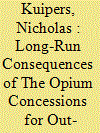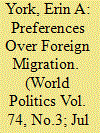| Srl | Item |
| 1 |
ID:
186731


|
|
|
|
|
| Summary/Abstract |
The Universal Declaration of Human Rights (UDHR) is thought to have shaped constitutions profoundly since its adoption in 1948. The authors identify two empirical implications that should follow from such influence. First, UDHR content should be reflected in subsequent national constitutions. Second, such reflections should bear the particular marks of the UDHR itself, not those of the postwar zeitgeist more broadly. The authors examine the historical evidence at various levels to identify and untangle the UDHR's impact. In a macro analysis, they leverage an original data set on the content of constitutions since 1789. They explore historical patterns in the creation and spread of rights, and test whether 1948 exhibits a noticeable disruption in rights provision. The authors build a multivariate model that predicts rights provision with constitution- and rights-level covariates. To gain further analytic leverage, they unearth the process that produced the UDHR and identify plausible alternative formulations evident in a set of discarded proposals. The authors further test the plausibility of UDHR influence by searching for direct references to the document in subsequent constitutional texts and constitutional proceedings. The evidence suggests that the UDHR significantly accelerated the adoption of a particular set of constitutional rights.
|
|
|
|
|
|
|
|
|
|
|
|
|
|
|
|
| 2 |
ID:
186733


|
|
|
|
|
| Summary/Abstract |
This article examines the consequences of the opium concession system in the Dutch East Indies—a nineteenth-century institution through which the Dutch would auction the monopolistic right to sell opium in a given locality. The winners of these auctions were invariably ethnic Chinese. The poverty of Java's indigenous population combined with opium's addictive properties meant that many individuals fell into destitution. The author argues that this institution put in motion a self-reinforcing arrangement that enriched one group and embittered the other with consequences that persist to the present day. Consistent with this theory, the author finds that individuals living today in villages where the opium concession system once operated report higher levels of out-group intolerance compared to individuals in nearby unexposed counterfactual villages. These findings improve the understanding of the historical conditions that structure antagonisms between competing groups.
|
|
|
|
|
|
|
|
|
|
|
|
|
|
|
|
| 3 |
ID:
186732


|
|
|
|
|
| Summary/Abstract |
Do individuals previously targeted by genocide become more supportive of other victimized groups? How are these political lessons internalized and passed down across generations? To answer these questions, the authors leverage original survey data collected among Holocaust survivors in the United States and their descendants, Jews with no immediate family connection to the Holocaust, and non-Jewish Americans. They find that historical victimization is associated with increased support for vulnerable out-groups, generating stable political attitudes that endure across generations. Holocaust survivors are most supportive of aiding refugees, followed by descendants, especially those who grew up discussing the Holocaust with their survivor relatives. An embedded experiment demonstrates the steadfastness of these attitudes: unlike non-Jews or Jews without survivor relatives, survivors’ and descendants’ views toward refugees do not change after reading an in-group versus out-group–protective interpretation of the “never again” imperative. Histories of victimization can play an ameliorative role in intergroup relations.
|
|
|
|
|
|
|
|
|
|
|
|
|
|
|
|
| 4 |
ID:
186734


|
|
|
|
|
| Summary/Abstract |
Do existing theories regarding the impact of foreign migration explain preferences in non-OECD countries? The author adapts and applies explanations for opposition to migration in the Arabian Gulf, a significant region in global migration today, using a survey experiment implemented in Qatar. The results offer a rare validation of predictions from the labor market competition model, demonstrating that individual employment circumstances are important preference determinants. Additionally, while OECD citizens prefer high-skilled migrants, Qataris are indifferent about blue- versus white-collar workers. Mediation analysis suggests that this null effect is the result of competing cultural and economic concerns over the effect of differing classes of migrants on economic and social welfare. The novel context provides a critical test case of the labor market hypothesis and offers insight into how migration preferences in the Global South differ from the Western experience.
|
|
|
|
|
|
|
|
|
|
|
|
|
|
|
|